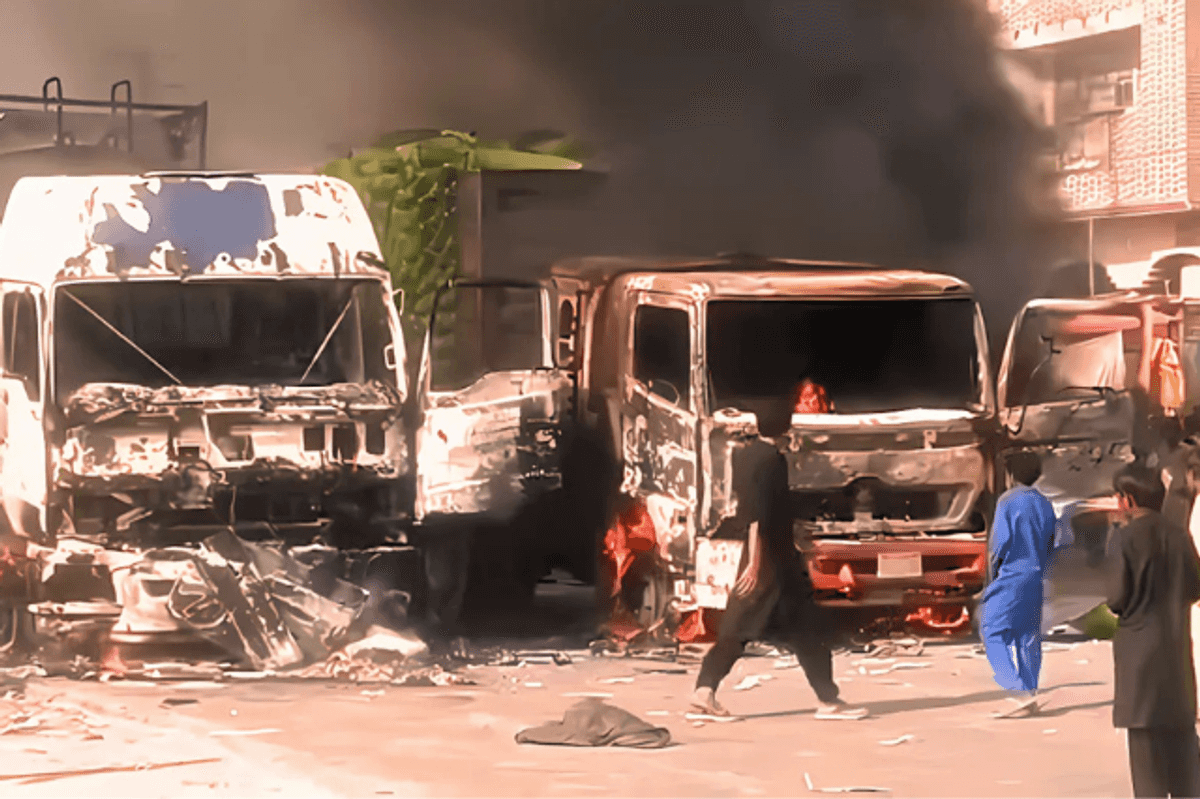Violent protest erupts in Pakistan's Sindh over corporate farming, Indus canal
Protesters in Moro attack police, torch vehicles, and allegedly set fire to Sindh home minister’s residence
Ahmer Rehman
Senior Correspondent
Ahmer Rehman Khan is a experienced Journalist with over 17 years of expertise, specializing in crime and investigative reporting. His career includes serving as the Chief Crime Reporter at Samaa TV, where he led significant coverage of crime events. Prior to that, he held Senior Correspondent roles at major news networks including Geo TV, Dunya TV, Express TV, and Aaj News.

Protestors set fire to a vehicle during violent protests in Moro, Sindh.
Nukta
A protest led by a Sindhi nationalist group in Moro turned violent on Tuesday as demonstrators rallied against corporate farming and perceived water theft through the Indus canal system.
The protesters blocked Moro's main road, vandalized vehicles, and clashed with police, sparking widespread unrest in the town, located in Sindh’s Naushahro Feroze district.
Footage from the scene showed protesters attacking a police officer with sticks and dragging him along the road. In the ensuing chaos, the crowd reportedly set fire to the residence of Sindh Home Minister Zia Lanjar.
In response, Lanjar sought a detailed report from the Senior Superintendent of Police (SSP) Naushahro Feroze. “Strict action will be taken against those who sabotaged law and order and challenged the writ of the state,” Lanjar said in a statement issued by his office.
He ordered the deployment of fresh police units at the district level to restore order and directed law enforcement to identify and arrest the vandals responsible for damaging public and private property.
“Those involved in unrest and violence must face legal consequences,” he said.
The interior minister also emphasized that citizens’ property must be protected and lawbreakers should be dealt with firmly under the law.
‘Cowardly and provocative’
Sindh government spokesperson Saadia Javed strongly condemned the attack on Home Minister Lanjar’s residence in Moro, describing it as a “cowardly and unfortunate act” and a “deliberate provocation”.
“Targeting someone’s home goes against Sindh’s centuries-old traditions of tolerance and respect. Such actions are always considered disgraceful and unacceptable in our culture,” she said in a statement.
Javed further said that the incident, carried out under the guise of a canal dispute, was nothing short of sabotage and those responsible must be brought to justice.
“These are not spontaneous actions — they are calculated attempts to incite unrest in society, and they will not be tolerated,” she added.
The spokesperson said that attacking the homes of elected representatives is a direct assault on democratic values and would be opposed at every level.
“The arson attack on the minister’s house is a sinister conspiracy to destabilize law and order,” she said. “Law enforcement agencies must take swift action against those involved so that such acts are not repeated.”
She reiterated that violent acts like these will not be allowed to erode Sindh’s long-standing legacy of communal harmony and peaceful coexistence.
Canal project freeze
Last month, the Council of Common Interests (CCI) announced a pause in the construction plans for new canals on the Indus River and decided that no future canal projects will proceed without unanimous agreement among the provinces.
“The federal government will not construct any new canals without mutual understanding,” the statement read, adding that a national, consensus-based roadmap for agricultural development and water management will be developed in consultation with all provincial governments.
The decision was made after Prime Minister Shehbaz Sharif chaired an emergency session of the CCI in response to the escalating crisis.
Canal projects and Green Initiative
The federal government’s original plan included the construction of six new canals, five on the Indus River and one on the Sutlej River. These were: the Rainee and Thar Canals in Sindh, the Kacchi Canal in Balochistan, the Chashma Right Bank Canal in Khyber Pakhtunkhwa, and the Cholistan and Greater Thal Canals in Punjab.
Three of these, Rainee, Kacchi, and Chashma Right Bank, have been under construction since the early 2000s, predating the current dispute. However, they have long drawn criticism from water experts and civil society in Sindh, who argue that further canal development could exacerbate water scarcity and environmental degradation, particularly in the already fragile Indus Delta.
These projects are part of the Pakistan Green Initiative, which aims to expand corporate farming nationwide through public-private partnerships.







Comments
See what people are discussing